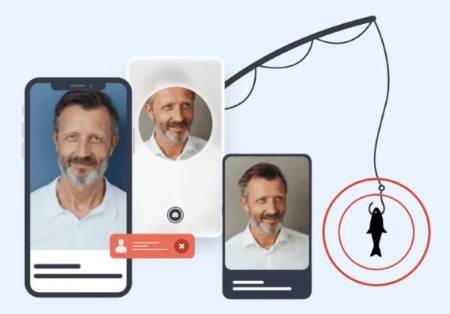Chesa Keane, an Associate member of Global Travelers, is a long-time consultant in many aspects of IT. As members of a virtual Rotary club, we are all, by definition, on-line to various degrees. And, like many things in life, being on-line comes with risk. Chesa has generously agreed to create a web series for our members with tips for helping us avoid becoming the victim of online scams. This is her eighth installment, focused on online romance scams.
Times are different. My father built our first television and dating used to be the happenstance of meeting someone simply through life or by accident. Finding companionship or a potential life partner was through our social circles or for the brave, the Personals (or Personal Ads). Of course, the option of a Match Maker or Mail Order Brides/Grooms still exists in some cultures. Back then, the closest thing to seeking love in all the right places was if a friend set you up on a blind date.
But today, dating has become a different animal with online dating sites such as Tinder, Bumble, Hinge, eHarmony, OkCupid, Plenty of Fish, Zoosk and Christian Mingle, to name a few. There are many articles out there purporting to give you the “Best Online Dating Sites of 2025….” Just Google it for yourself if you are interested.

Online dating sites may be something in which you are interested – or not – but the fact is, the very act of seeking companionship from a stranger online carries a lot of risk. Several factors enhance this risk and many of those factors simply fall into their own category I’ll call Human Nature. That is, if you are actively seeking a relationship, you must be sure that your Danger, Danger Will Robinson antennae are alerting on anyone with which you engage online.
Why?
Because most of us are trusting and if you are looking for companionship, you might be a little lonely. Those two factors are a deadly combination. You can be catfished (scammed by someone who is using your nature against you) through a social media site, a dating site, or through a random email reach-out. Catfishing can also be an in-person scam as well. It’s not just some faceless scoundrel trolling a dating site where you can be victimized. A true-blue scammer can do their magic in person as well as behind online images.
Let’s look at a few scenarios:

Online Dating
You muster up your brave and register with an online dating app. You are asked to provide your name, a profile telling prospects a little about yourself, your age and some photos. Of course, you might be tempted to shave a few years off your age and upload some of your best photos from 20 years ago. After all, you can deal with these small indiscretions if Mr./Ms. Right comes along. Ah, but here’s the issue ~ so can the scammer from Nigeria. Remember, one of the most valuable documents you can have in your possession is an American passport or Green Card and many are looking for the person that would help them to come to America.
Social Media
Whether its FaceBook, X, BlueSky, TikTok, or Instagram there are always opportunities to meet someone with similar attitudes, values and experiences simply through engaging in posts on these social media sites. How is that a problem? When you engage in social media posts, you tend to reveal a lot about yourself – what you like, what you don’t like, the area of the country where you live, and some of your most personal experiences. People easily share their marital status, their life problems and successes and their hopes, dreams and fears. All these characteristics paint you as a target for someone looking to connect with you for good or evil. The grifter looking for a mark takes these traits you have painted of yourself and builds themself as a perfect partner for you, knowing your how you think.

I think you have the picture. Please don’t fall into the trap that you can’t be fooled. Everyone can be fooled, and unfortunately, we set ourselves up for failure if we think we are emotionally bullet-proof.

How Can You Spot a Romance Scam?
Here are some red flags to watch out for:
- Wrong Number ~ You receive a wrong number call or text or even email and it turns into a conversation you didn’t expect. Now a relationship is developing. Is it always a scam? Maybe not, but you could be dealing with a professional listener, someone who can hear from your tone, language and topics of conversation what is important to you. Your personality will be fluffed in ways that are fun, personal, flirty and intimate before you know it. The next steps can be deep betrayal.
How Can You Spot a Romance Scam?
Here are some red flags to watch out for:
- Wrong Number ~ You receive a wrong number call or text or even email and it turns into a conversation you didn’t expect. Now a relationship is developing. Is it always a scam? Maybe not, but you could be dealing with a professional listener, someone who can hear from your tone, language and topics of conversation what is important to you. Your personality will be fluffed in ways that are fun, personal, flirty and intimate before you know it. The next steps can be deep betrayal.
- They want to immediately talk in person ~ Rather than take some time to build your relationship, the grifter wants to get off the dating or social media site quickly so they can by-pass any protections or signs that may give them away as a scammer. Take your time.
- Distance ~ When you find someone from another country or state showing a strong interest, be careful. After all, are you really in this for a long-distance relationship? You may find yourself making plans to meet up after some time engaging them online, but oddly, they keep canceling those plans. Why? Because they may not be that tall, dark and handsome guy, but rather a motley troll in Texas just waiting for the next step to draw you into their scam.
- Love Bombing ~ How quickly does the sweet talk begin? Do they flood you with compliments and declarations of love within a short time? How does that seem
- real? It isn’t. But make no mistake, there is something about the anonymous nature of the Internet that makes a person believe in quick love online where they would be suspicious in person. Ask yourself if the romance language is real or is it what you want to hear.
- Don’t trust photos ~ Just because you see a set of photos that interest you, realize that you need to be suspicious. It will keep you safe. There are websites that will do reverse imaging for you. For example, go to com that will help you search a name, age, address and images of those in question. Use this site.
- They never talk or facetime ~ anyone who texts or posts you online but never shares their photo or voice just might be a 25-year-old Nigerian man looking for a green card or a grifting woman from a trailer park in Tuskegee. How would you know otherwise?
- They ask for money ~ Here it is. Scammers will always get around to asking you for money. They may need money for:
- Plane fare to come meet you. Oddly, they missed the flight.
- Their rent is due, and they are getting evicted. It was an unexpected bad turn of luck.
- They express that they have a legal or medical crisis or a business disaster. They need the money fast and you seem to be the only one who cares or who can help.
- They have a business opportunity that will make you both the money you need to start your new life together.
- The amount of money stolen from you is only limited by how much you have and how long they have to take it from you.
How do we keep safe? It is very difficult to change your nature – you may be a very trusting person or perhaps you are crazy lonely right now. My best advice is to slow things down. A scammer will be engaging lots of people at the same time and if you are not ready and willing to play the romance game or send them the money they want on their schedule, you will be dropped. This is a good thing. Some quick points to consider:

- Don’t overshare about your life online. You never know who’s watching.
- You can use spam blocking on phone calls, text messages and email.
- Share new love interests with friends and family – they can often see what you don’t.
- Investigate these new relationships. Run checks, reverse images, information sites. Let me know if you need more details.
- Never, never, never give these online paramours any money. Never. None. Zilch.
- If you suspect something is strange, disconnect from them immediately. Trust your gut.
- Report any scammer to local law enforcement, FTC, or FBI Internet Complaint Center (gov).
Remember, it always comes down to money or other gain (green card, gifts, etc.) and if you don’t want to be taken for mass amounts of money, pay attention. If it feels sketchy, it is sketchy. If someone is falling in love at sonic speeds, they are scamming you. If they just have a rash of bad luck and need financial help, thy are scamming you. Don’t let your pride prevent you from walking away from the scam. Better late than never.
Looking for more? Read Chesa’s other informative articles:

